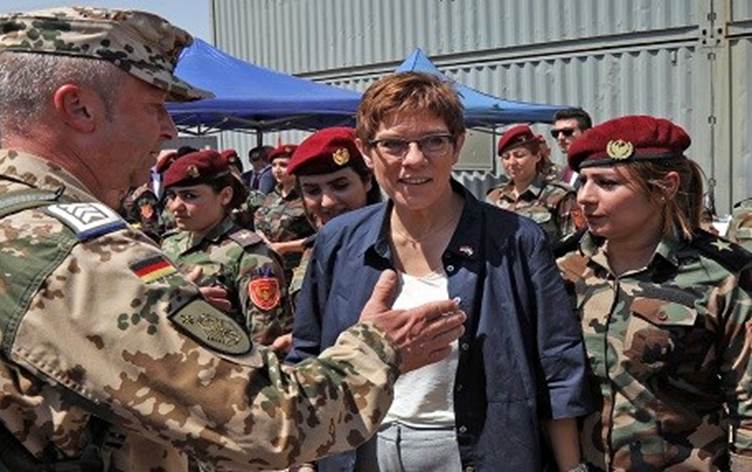
German Defence Minister Annegret Kramp-Karrenbauer meeting female Peshmerga fighters in Erbil on August 21, 2019. Photo: AFP/Safin Hamed
Speaking at a press conference with Peshmerga Minister Shorish Ismael today, Annegret Kramp-Karrenbauer said that ISIS has not left Iraq.
“ISIS has resurged,” she said. “But now we do not know how will their resurgence look like and in what form it will be.”
Kramp-Karrenbauer spent the day meeting Kurdish officials in Erbil with her colleagues. She said the German parliament will hold a session next week and "make the right decision" on what to do next to take fresh measures against ISIS.
After ISIS swept through northern Iraq in 2014, Germany supplied Kurdish Peshmerga forces with weapons and training, as did other Western nations.
At the conference, Ismael commended Berlin's "unlimited" military and logistical support for the Peshmrga during the ISIS conflict.
"Supplying weapons and munitions from Germany to the Kurdistan was historical," he said. "They supplied abundant medicines to us and opened a hospital for us."
"Had it not been for the unlimited support of the German military personnel team and government, our people would have faced a lot of plights due to the ISIS attacks.”
Germany has supported the Kurdistan Regional Government (KRG) in other ways as well. Germany officially handed over the Peshmerga Hospital in Erbil to the KRG in April after building it for a year and a half .The facility will be used to treat members of the Kurdistan Region’s security forces wounded in the ISIS war.
Some 772 Peshmerga who were wounded in the ISIS conflict have received treatment abroad to date. More than 10,000 Peshmerga were wounded in total during the four-year war with ISIS and more than 1,800 were killed.
Up to 150 German personnel are at the US-led anti-ISIS coalition base in Erbil.
Karrenbauer was in Baghdad on Tuesday morning, where she met Prime Minister Adi Abdul Mahdi, President Barham Salih and Speaker of the Council of Representatives Mohammed al-Halbousi.
The federal government seeks to cultivate its relationship with Germany as well.
"Iraq is keen to enhance and develop relations with the Federal Republic of Germany in all appropriate fields and in ways conducive to the advancement of common interests," said Salih during his meeting with Kramp-Karrenbauer, adding that he "valued" Germany's support for the Iraqi military against ISIS and Berlin's "construction efforts".
Abdul-Mahdi likewise "praised the role that Germany plays in achieving global peace" in their meeting, according to a Facebook post the PM.
The German defence minister said that Germany wants to train Iraqi forces, improve Iraq's infrastructure and increase economic cooperation, according to Abdul-Mahdi.
Halbousi also said Iraq was keen to maintain "closer military cooperation and support the Iraqi security system with expertise, logistical and technical support, intelligence advice and training of Iraqi security forces,” according to a post on his Facebook page.
Germany is a member of the US-led anti-ISIS coalition, officially known as Combined Joint Task Force-Operation Inherent Resolve (CJTF-OIR). Its parliament renewed force deployment for Iraq and Syria in September 2018 amid speculation that it would withdraw all forces because of the new government.
Germany became involved in the ISIS conflict in 2015 at the request of the Iraqi government. It has worked through the UN's Funding Facility for Stabilization to support security forces and now stabilization and reconstruction in the country.








Comments
Rudaw moderates all comments submitted on our website. We welcome comments which are relevant to the article and encourage further discussion about the issues that matter to you. We also welcome constructive criticism about Rudaw.
To be approved for publication, however, your comments must meet our community guidelines.
We will not tolerate the following: profanity, threats, personal attacks, vulgarity, abuse (such as sexism, racism, homophobia or xenophobia), or commercial or personal promotion.
Comments that do not meet our guidelines will be rejected. Comments are not edited – they are either approved or rejected.
Post a comment